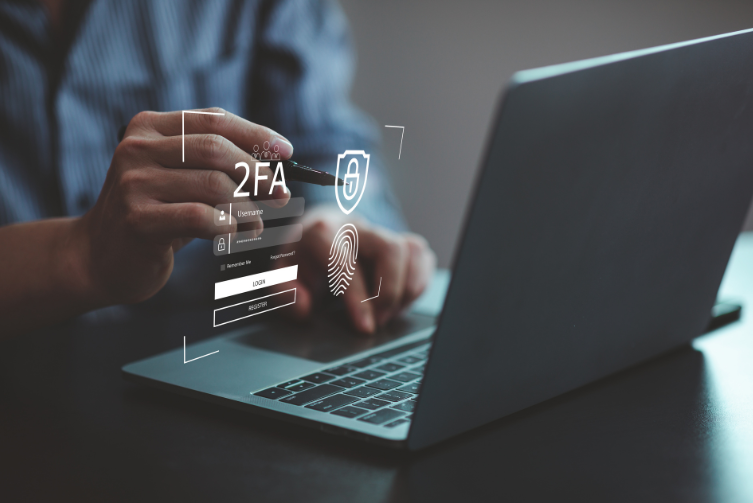Safeguarding Your Digital Life: A Guide to Protecting Yourself from Fraud

Stay a step ahead of cybercriminals with our comprehensive guide to protecting your digital life. From creating strong passwords to recognizing phishing scams, Hughes Federal Credit Union's VP of Cybersecurity, Mark Frieden, shares essential tips to safeguard your personal and financial information online.
By Mark Frieden, Vice President, Cybersecurity at Hughes Federal Credit Union
In today's interconnected world, the risk of falling victim to fraud is a growing concern. Cybercriminals are becoming increasingly sophisticated, employing new tactics to steal personal information and financial resources. To protect yourself and your family, it's essential to establish robust cybersecurity measures. This article provides essential steps to safeguard your digital well-being.
The Foundation of Digital Security: Strong Passwords
- Utilize password managers: These tools generate complex, unique passwords and store them securely, relieving you of the burden of remembering numerous passwords.
- Prioritize password hygiene: Regularly change your passwords, especially if you suspect any suspicious activity. Never reuse passwords across different accounts.
- Embrace randomness: Create strong, random passwords using your password manager for maximum security.
- Enable multi-factor authentication (MFA): This adds an extra layer of security by requiring additional verification beyond a password.
Create a family password: Establish a shared password for family members to verify identity during calls or other communications.
Safe Online Practices: Protecting Your Digital Footprint
Beyond strong passwords, adopting safe online habits is essential:
- Be cautious on public computers: Always log out of your accounts when using public computers or kiosks.
- Safeguard your online banking: Avoid clicking on links in emails related to online banking. Instead, use your bookmarked link. Verify the website URL before entering sensitive information.
- Secure your Wi-Fi connections: Connect only to public Wi-Fi networks that require a password. Prioritize using cellular data for sensitive activities.
- Protect your devices: Enable pin, face, or fingerprint recognition for mobile device access.
- Safeguard your OTP: Never share your One-Time Password (OTP) with anyone.
- Be wary of unsolicited communications: Exercise caution with unsolicited emails, texts, and calls.
- Verify links before clicking: Hover your mouse over links to ensure they match the expected destination before clicking.
Keep software updated: Regularly update your operating system, antivirus software, and web browser with the latest security patches.
Protecting Your Financial Information: Online Banking Precautions
Online banking offers convenience but requires extra vigilance:
- Utilize strong, unique passwords: Create different, complex passwords for your online banking and other accounts.
- Be aware of phishing attacks: Be cautious of emails or calls claiming to be from your bank and requesting personal information.
- Monitor your accounts: Regularly review your bank statements for unauthorized transactions.
- Secure your computer: Install antivirus and firewall software to protect against malware.
- Exercise caution on public Wi-Fi: Avoid accessing online banking on public Wi-Fi networks and if the Wi-Fi network does not have a password switch to cellular.
Limit shared computer use: Avoid accessing your bank account on shared computers.
Understanding Fraudster Tactics: Staying Vigilant
Knowledge of common fraud tactics is crucial for staying protected:
- Email phishing: Fraudsters often use deceptive emails to trick victims and prey on their emotions to reveal personal information. Be wary of urgent requests, unexpected email conversations, targeted scams, and business email compromise (BEC).
- Vishing (phone phishing): Phone scams, or vishing, involve fraudsters posing as legitimate entities to obtain sensitive information. Beware of technical support scams, government official impersonations, and AI-generated voice scams.
Smishing (SMS phishing): Text messages can also be used to deceive victims. Be cautious of banking scams, parcel delivery scams, and password reset scams.
By understanding these tactics and implementing the recommended precautions, you can significantly reduce your risk of falling victim to fraud. Stay informed, maintain vigilance, and prioritize the protection of your family's digital well-being.
Remember, prevention is key. By adopting these cybersecurity best practices, you can significantly enhance your digital security and protect your personal information and financial assets.
Additional Tips:
- Educate your family members about online safety.
- Consider using a virtual private network (VPN) for added protection when using public Wi-Fi.
- Regularly back up your important data.
- Be cautious about sharing personal information on social media. Don’t participate in surveys or re-friend someone you know you’re already friends with.
Review your credit report regularly for any suspicious activity.
By following these guidelines and staying informed about the latest threats, you can take control of your digital security and enjoy peace of mind.